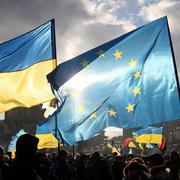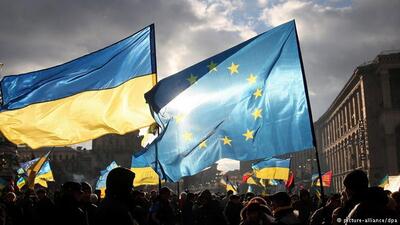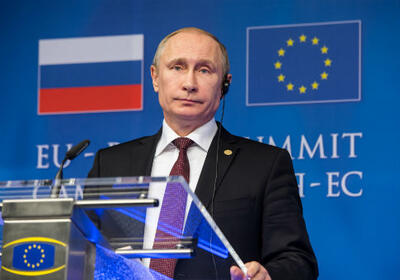
Ukraine has pride of place in the dream-world of Russian greatness, Igor Torbakov says. What does this mean for its relationship with the EU and Europe in general?

Find out on Monday, October 16, when Torbakov presents "The Ukraine Factor in Russia-Europe Relations" as part of HURI's Seminar in Ukrainian Studies. The talk begins at 4:15 in Room S-050, CGIS South Building, 1730 Cambridge Street, and is open to the public.
In addition to being a Ukrainian Studies Fund Research Fellow at HURI this fall, Torbakov is a Senior Fellow at the Institute for Russian and Eurasian Studies at Uppsala University and an Associate Senior Fellow at the Swedish Institute of International Affairs in Stockholm.
A historian by training, Torbakov is tackling a topic that is more commonly approached by political scientists and international relations specialists. As such, his talk will be of interest to scholars involved in Russian or Ukrainian studies, Europeanists, and specialists conducting research in the fields of comparative empire studies, critical geopolitics, and political imagination.
Torbakov answered a few of our questions to shed more light on his work and the upcoming presentation:
HURI: What will you be talking about during your presentation, and how does it fit into your research at HURI as a USF Fellow?
Torbakov: In my talk, I intend to discuss how developments in and around Ukraine influenced the way the two intertwined processes unfolded: the EU-Russia interaction in their shared – and contested – neighborhood; and the peculiar dynamics of Russia’s self-understanding, in particular, Russian elites’ shifting perspective on the thorny question of Russia’s “Europeanness.”
This topic is part of a broader research project with a working title “The symbolic geographies of empires.” In their international conduct, in particular, in their respective “neighborhood policies,” both Russia and the EU resemble (quasi) imperial formations, possessing a sense of strategic depth, of spheres of identity, etc. Ukraine became a “shatter zone” where the EU- and Russia-led integration projects collided. Yet given Russia’s enormous – bi-continental! – territorial expanse (which itself is a legacy of empire), there are other shared postimperial peripheries that Moscow needs to manage as it interacts with international actors which also are heirs of glorious empires – such as China and Turkey. The latter in particular displays – in the form of neo-Ottomanism – a fascinating example of (post)imperial symbolic geography that very much resembles Russia’s own neo-Eurasianism.
HURI: Why did you choose to explore this topic?
Torbakov: I might appear as someone, who, as an historian, is pushing his wares, but I would suggest that there is a deficit of historical reflection as far as the uneasy relationship within the EU-Ukraine-Russia triangle is concerned. Historians seem to be crowded out by political scientists and IR specialists. And yet social constructions of Europe in Russia (and Russia in Europe) as well as the interplay between the “Ukrainian question” and “Russian question” go back centuries. My modest intention was to offer a broader historical perspective on these issues.
 HURI: How does this current iteration of the Russia-Europe problem and political imagining fit into the Slavophile vs Westernizer debate of years past? Is Russia different from other countries in the way political imaginations influence its actions?
HURI: How does this current iteration of the Russia-Europe problem and political imagining fit into the Slavophile vs Westernizer debate of years past? Is Russia different from other countries in the way political imaginations influence its actions?
Torbakov: As I see it, the 19th century Slavophile vs. Westernizer debate was only the first stage in a whole series of attempts by Russian nationalist thinkers to challenge the Eurocentric outlook. It all began with a suggestion of a mild version of Russian Sonderweg in the 1830s and ended in the early 1920s with the imagining of Russia as “Eurasia”, i.e. as a principally non-European self-contained civilization. Contemporary Russian ideologues draw on this entire rich reservoir of metaphors, meanings, images, and tropes. Yet Russia of course is by no means unique. Other countries (including those in Europe) that encountered modernity dressed, so to speak, in the West European garb, saw intellectual debates resembling Russia’s Westernizer-Slavophile controversy. Again, Turkey is another such country that comes to mind in this regard.
HURI: Is there one particular fact or insight about the topic that you find especially interesting? Anything in your research that surprised you?
Torbakov: What is truly fascinating is how quickly Russia’s official/mainstream perspective on “Europe” has run full circle during the Putin years: from the perception of Russia as a full-blown member of the European community of nations to the vision of it as part of a “Greater Europe” to imagining Russia as the “true Europe” and the EU as the “false Europe” to the contention that Russia constitutes a distinct civilization apart from Europe.
HURI: Anything else we should know?
Torbakov: Historians are usually concerned with things past. But given the cyclical nature of Russia-Europe relations, it would probably be safe to speculate that, after hitting the rock bottom, the relationship will rebound and a new phase of Russia’s “Europeanization” will begin. As it had been in the past, Ukraine will continue affecting Russia’s self-understanding and its standing vis-à-vis “Europe.”
 Igor Torbakov is a Senior Fellow at the Institute for Russian and Eurasian Studies at Uppsala University and Associate Senior Fellow at the Swedish Institute of International Affairs in Stockholm. A trained historian, he specializes in Russian and Eurasian history and politics. He was a Research Scholar at the Institute of Russian History, Russian Academy of Sciences in Moscow; a Visiting Scholar at the Kennan Institute (Woodrow Wilson International Center for Scholars) in Washington, DC; a Fulbright Scholar at Columbia University; a Visiting Fellow at Harvard University; a Fellow at the Swedish Collegium for Advanced Study; a Senior Fellow at the Finnish Institute of International Affairs in Helsinki; and a Visiting Fellow at the German Council on Foreign Relations in Berlin. He holds an MA in History from Moscow State University and a PhD from the Ukrainian Academy of Sciences. His recent publications discuss the history of Russian nationalism, Russian-Ukrainian relations, the links between Russia’s domestic politics and foreign policy, Russia’s and Turkey’s geopolitical discourses, and the politics of history and memory wars in Eastern Europe.
Igor Torbakov is a Senior Fellow at the Institute for Russian and Eurasian Studies at Uppsala University and Associate Senior Fellow at the Swedish Institute of International Affairs in Stockholm. A trained historian, he specializes in Russian and Eurasian history and politics. He was a Research Scholar at the Institute of Russian History, Russian Academy of Sciences in Moscow; a Visiting Scholar at the Kennan Institute (Woodrow Wilson International Center for Scholars) in Washington, DC; a Fulbright Scholar at Columbia University; a Visiting Fellow at Harvard University; a Fellow at the Swedish Collegium for Advanced Study; a Senior Fellow at the Finnish Institute of International Affairs in Helsinki; and a Visiting Fellow at the German Council on Foreign Relations in Berlin. He holds an MA in History from Moscow State University and a PhD from the Ukrainian Academy of Sciences. His recent publications discuss the history of Russian nationalism, Russian-Ukrainian relations, the links between Russia’s domestic politics and foreign policy, Russia’s and Turkey’s geopolitical discourses, and the politics of history and memory wars in Eastern Europe.